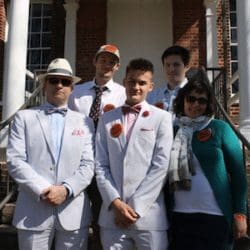As a spouse of a National Guardsman, I have stood in awe of his service - combining his military and civilian commitments nearly seamlessly. Now, as a military caregiver, I am standing in my service to be action oriented and able to meet challenges ready and able.
How has your life changed since you became a caregiver? What sacrifices have you had to make?
I have made the sacrifice of my career, though I have gained education, respect, patience, and perseverance.
At what moment did you realize you were a military caregiver?
One dark evening in late 2014, when my very capable husband – my rock, my mountain, my warrior – could not make a simple decision and said his whole world was upside down.
What advice would you offer to other military and veteran caregivers?
Firmly support your warrior, educate yourself about the affecting conditions, diagnoses and ailments, find your voice to advocate for your warrior, and speak up. I have a tendency to not take the first four No’s received – there always seems to be an exception to policy and other ways to support the warrior in the best way possible

My Story
When Colleen's husband Thomas returned home from Afghanistan in 2014, he was a completely different man. His invisible wounds of war manifested as they transitioned with him from combat to civilian life. Issues arose that are all too recognizable to the military community: memory issues, bouts of anger, severe fatigue, debilitating, migraines, and so much more. Thomas and Colleen are walking the path of transition, supporting him to be the best version of his new self and empowering him to live his life as an honored combat veteran.
The Elizabeth Dole Foundation provided Colleen with a source of hope, information, and resource when she felt like she was on her own. In her role as a Dole Caregiver Fellow, she wants to be an advocate for the military caregivers in Delaware, especially the underserved National Guard and Reserves; she wants to educate the military caregivers across their First State to the opportunities, support, and services that can make a positive impact on the caregiver; and she wants to innovate – to make a lasting impact on the fellowship in times of legislative, political, and social change with regards to veterans and their caregivers.









